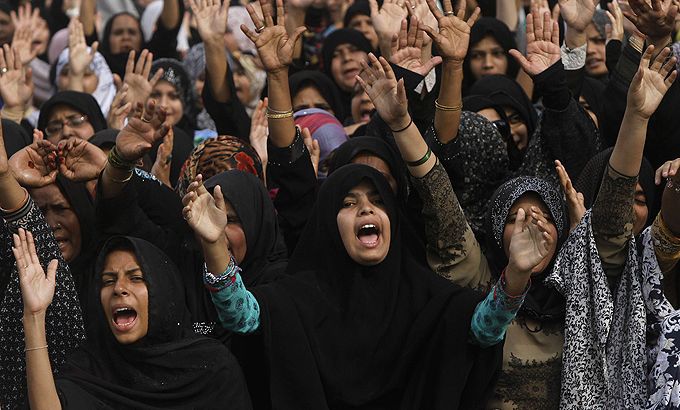Pakistan Shias refuse to bury Quetta dead
More than 4,000 Shias in Balochistan capital hold sit-in to demand swift government action against armed Sunni groups.

Thousands of Shias in Pakistan have held a sit-in in the city of Quetta, refusing to bury their dead for a second day, demanding that security forces protect them from armed Sunni groups.
More than 4,000 women blocked a road in the southwestern city on Monday, vowing to continue their protest until the authorities take action against those behind the attack that killed 84 members of the Hazara Shia community.
Protesters chanted “stop killing Shias”.
Volunteers armed with automatic rifles and pistols on Monday guarded the streets of Hazara Town, the scene of Saturday’s attack, the AFP news agency reported.
Police said they were in talks to end the protest. However, Qayyum Changezi, a local Shia party leader, said they “will not bury the dead until a targeted operation is launched”.
Amin Shaheedi, the vice president of the Shia Wahdatul Muslemeen party, demanded control of Quetta be handed over to the army.
|
“Terrorists are roaming freely and we are not given any protection. Our protest will continue until we get protection.“ – Amin Shaheedi, the vice-president of the Shia Wahdatul Muslemeen party |
“Terrorists are roaming freely and we are not given any protection. Our protest will continue until we get protection,” he told reporters.
The paramilitary Frontier Corps is largely responsible for security in Balochistan province, but Shias say it is unable or unwilling to protect them.
The Lashkar-e-Jhangvi, a pro-Sunni group, has claimed responsibility for a spate of attacks in recent past.
Solidarity demonstrations were held across the country, shutting down the largest city Karachi and closing the road from the capital to Islamabad airport, in angry protest at the latest bombing that also left 178 others wounded.
In the second largest city Lahore, hundreds of Shias demonstrated to press demands for military action against extremists in Quetta.
Karachi blasts
Meanwhile, three bombs in quick succession exploded in Karachi. One of the explosions occurred near the site where Shia Muslim protesters had gathered.
There was also an explosion at the house of a member of the Awami National Party, as well as a third blast in the suburb of Orangi.
Earlier, at least five people were killed after fighters wearing suicide vests and disguised as policemen attacked the office of a senior political official in northwestern city of Peshawar.
Two girls aged seven and nine were among the dead after the bomb, nearly a tonne of explosives hidden in a water tanker, tore through a crowded market in a neighbourhood dominated by the ethnic Hazara minority.
The attack came just over a month after suicide bombers killed 95 people at a snooker hall in another Hazara neighbourhood of Quetta, the capital of Balochistan.
Protesters are furious at the authorities’ failure to tackle rising attacks on Shias in Balochistan, which has seen more than 200 deaths in the last 35 days.
The provincial government was sacked after the January attack, which led relatives of the victims to refuse to bury their dead while they held a 76-hour protest sit-in.
The governor has said the blast was the result of a failure of the provincial security and intelligence agencies.
“Officials and personnel of these institutions are scared [of the terrorists]. Therefore they don’t take action against them,” Zulfiqar Magsi said in comments broadcast on local television.
Rahman Malik, Pakistan’s interior minister, told Al Jazeera on Sunday his government was “taking every possible measure to provide full security to the Shia community”.
“We really feel sorry for the victims. Obviously those who are trying to destabilise Pakistan through sectarianism, I think that they have a plan… We have been handling it, and we will handle it further.”
Last year was the deadliest for Pakistan’s Shia community, which accounts for about 20 percent of the population, with more than 400 people dead in targeted killings.